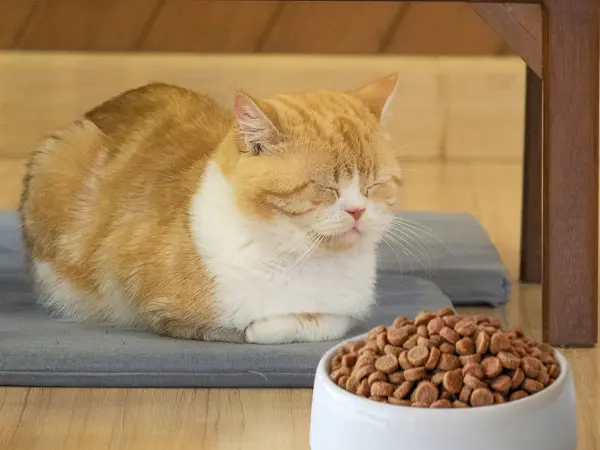When your cat is not eating or eats less than usual, it’s advisable to pause and pay attention. Some of the most common reasons cats lose their appetite include stress, picky eating behaviors, free feeding, dental pain, stomach pain, and other feline medical issues.
This Sploot Vets guide explores the most common reasons why a cat is not eating and what to do next to help your feline friend feel better.
Why Is My Cat Not Eating?: 11 Possible Reasons
1. Food Preference & Picky Eating
Cats are known for being selective or picky eaters. Sometimes, your cat may simply not like a certain cat food’s flavor, smell, or texture. Some cats also get tired of their usual cat food after a while, even if they used to find that cat food appealing.
What to do next: Consult a veterinarian to confirm that your cat is not eating (or eating less) solely because of food preference. They can then offer guidance on other AAFCO-compliant cat food options that you can try.
2. Leaving Out the Food Too Long (Free Feeding)
Free feeding is a method of feeding pets wherein food (typically dry food) is left out, allowing them to eat whenever they want. At Sploot, we generally don’t recommend free feeding as this can lead to unhealthy weight gain in cats. Another common effect of free feeding cats is reduced appetite.
What to do next: Once a vet confirms that this is the cause of your cat’s loss of appetite, they’d likely recommend shifting to scheduled feeding times and avoiding leaving cat food out for too long.
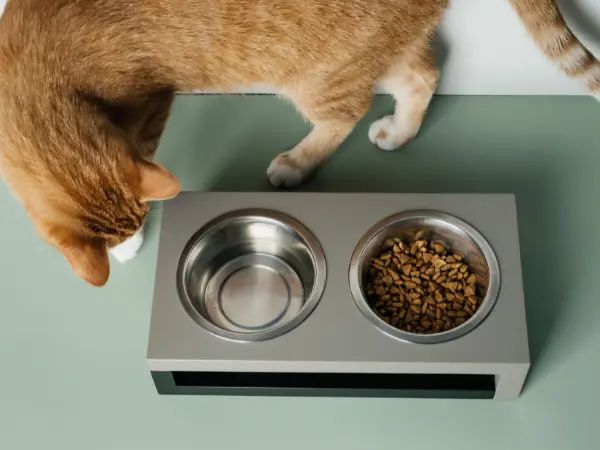
3. Stress & Anxiety in Cats
Cats are sensitive to changes in their environment. Moving homes, a new pet, or even rearranging furniture can cause stress and anxiety in cats, and it can potentially suppress their appetite (along with other symptoms like hiding, clinginess, or aggression).
Additionally, some cats with separation anxiety (typically Ragdolls, Persians, etc.) may refuse to eat when left alone or separated from their pet parent.
What to do next: Keep your cat’s routine and environment as consistent as possible and provide them with a quiet, safe feeding area. If your cat is suffering from prolonged stress and anxiety, consult your veterinarian.
4. Change in Cat Food
Have you changed your cat’s food brand or formula lately? Doing this too quickly can upset your cat’s stomach, which can impact their appetite. In other cases, cats will not eat new cat food due to its unfamiliar taste, texture, or smell.
What to do next: Notify your veterinarian about your cat’s reaction to the new cat food. They might recommend a slower transition to the new cat food.
a. How to Change Cat Food [General Guidelines]
For most cats, our veterinarians recommend the following cat food transition schedule:
- Days 1 - 2 = 25% new cat food + 75% old cat food (1:3)
- Days 3 - 4 = 50% new cat food + 50% old cat food (1:1)
- Days 5 - 6 = 75% new cat food + 25% old cat food (3:1)
- Day 7 = all new cat food
b. How to Change Cat Food [Slower Transition for Sensitive Stomachs]
If your cat has a sensitive stomach, along with a fitting cat food choice, our veterinarians may recommend a slower cat food transition schedule:
- First 1 - 2 weeks = 90% old cat food + 10% new cat food
- Next 1 - 2 weeks = 80% old cat food + 20% new cat food
- Next 1 - 2 weeks = 70% old cat food + 30% new cat food
- So on and so forth until the new cat food is completely weaned in.
5. Gastrointestinal Problems in Cats
Issues like constipation in cats, hairballs, intestinal blockages, or an upset stomach can make your cat feel nauseated or full, thus reducing their appetite. In such cases, you might notice your cat not eating and throwing up (a common sign of gastrointestinal issues in cats).
What to do next: Contact an urgent care veterinarian, especially if your cat has symptoms like vomiting or diarrhea, along with appetite loss.
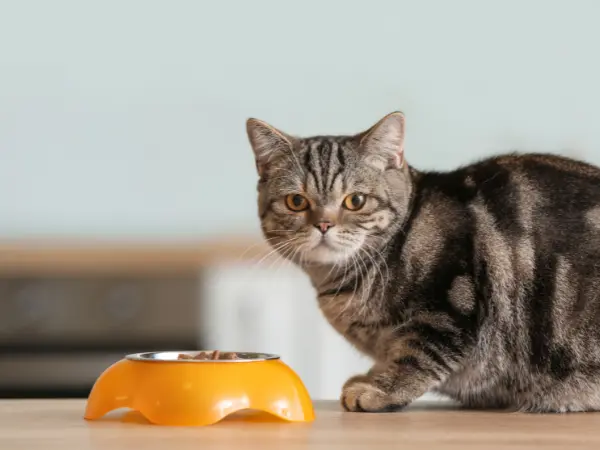
6. Infections & Illness (mention respiratory infection)
Respiratory infections, such as feline upper respiratory disease, can reduce your cat’s sense of smell, making food less appealing. Other infections and illnesses may also cause nausea, lethargy, and loss of appetite, resulting in your cat not eating.
What to do next: If you suspect your cat is sick, we recommend notifying your veterinarian. If your cat has severe symptoms of illness (e.g., a high fever, lethargy, vomiting), we recommend reaching out to an urgent care veterinarian with walk-in or same-day availability.
7. Feline Dental Issues
Dental pain from gingivitis, tooth resorption, abscesses, and other cat dental issues can make chewing uncomfortable for cats, leading to cats not eating as much or avoiding hard kibble. In some cases, cats may also chew on just one side of their mouth to avoid pain.
What to do next: If your cat is showing signs of dental problems, reach out to a veterinary care provider (like Sploot) that offers cat dental care.
8. Age-Related Changes
Senior cats may experience a dulled sense of smell or taste, which can affect their appetite. Some older cats may also have metabolic or mobility changes that cause them to not eat like they used to.
What to do next: For some senior cats, warming their food and releasing its aroma can help boost the cat’s appetite. Your veterinarian may also suggest switching to senior cat food, which can be more appealing and, more importantly, provides your cat with the nutritional support they need for their age.
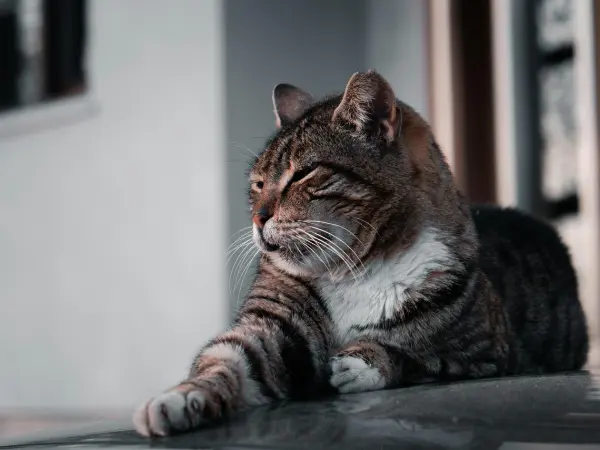
9. Kidney Disease
Chronic kidney disease is a common feline condition, especially in older cats. Kidney disease can reduce appetite, leading to affected cats not eating like normal. Other symptoms to look out for include weight loss, increased thirst, frequent urination, lethargy, and vomiting.
What to do next: If your cat isn’t eating and showing other symptoms of chronic kidney disease, take them to a veterinarian for a check-up, bloodwork, and urinalysis to diagnose their condition. Early treatment can help manage symptoms and improve their quality of life.
10. Recent Vaccinations
After getting the necessary cat vaccines, it’s normal for cats to feel lethargic and have a mildly reduced appetite. For the next day or two, your cat may not eat like they used to.
What to do next: Closely monitor your cat and if they don’t show improvements in the next 24 hours or show any severe reactions, contact your veterinarian.
11. Medication Side Effects
While prescribed medications are helpful for treatment, some common cat medications can reduce their appetite. These include the following:
- Pain medication for cats
- Antibiotics
- Anti-inflammatory meds
- Long-term anxiety meds (especially SSRIs)
In addition, the illness or injury that your cat is being treated for can also affect their appetite. A mild loss of appetite can be expected as your cat rests and recovers.
What to do next: Try warming your cat’s food or using cat-friendly food toppers to make their food more appealing during recovery. Some cats may also prefer wet food when they’re sick. If your cat is refusing all food or has a diminished appetite for more than 12 to 24 hours, contact your veterinarian.
What Do You Do When A Cat Won’t Eat?
If your cat is not eating normally, it may be time to call a veterinarian. While there are a variety of reasons why cats lose their appetite (e.g., food preferences, stress, open feeding), it’s also possible that your cat may have dietary, medical, or dental issues as well.
By going to a veterinarian, you’ll be able to rule out or treat more serious possible causes as to why your cat is not eating. Additionally, if your cat simply needs a change in cat food or other lifestyle tweaks, a trusted veterinarian can provide personalized recommendations.
When Should I Worry About My Cat Not Eating?
Cats are generally more sensitive to missing their meals than dogs. As obligate carnivores (not omnivores like humans and dogs), cats rely on a steady intake of protein and amino acids. For this reason, it’s always best to reach out to a veterinarian if your cat suddenly stops eating or is uncharacteristically eating significantly less.
It may be best to reach out to an urgent care veterinarian if…
- Your cat hasn’t eaten for more than 12 to 24 hours.
- Aside from refusing to eat, your cat also has other symptoms like retching, vomiting, lethargy, or pain. (Note: cats are good at hiding their pain and may instead avoid interactions, hide, or show aggression)
- Your cat is a kitten, a senior cat, or has a chronic health condition. These can make your cat even more sensitive to irregularities in their diet.
Final Thoughts on Cat’s Not Eating Normally
A cat not eating can be caused by something as simple as temporary stress or as serious as an underlying medical or dental issue. Because cats are sensitive to missing meals, it’s best to seek veterinary advice if your cat isn’t eating normally.
Reach out to an urgent care veterinarian if your cat hasn’t eaten for 12 to 24 hours, if your cat is not eating and throwing up, or if they’re showing other severe symptoms.
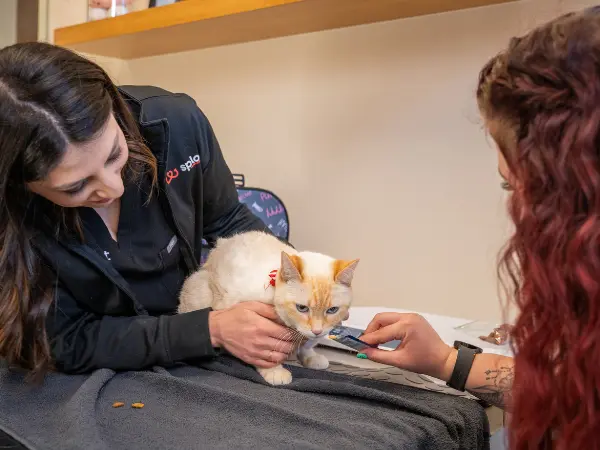
Sploot Vets: Your All-in-One Cat Vet
If you’re concerned about your cat not eating or facing other potential feline health issues, Sploot Vets is here to help. Our team is here to help your feline companion stay as healthy and happy as possible.
We provide all-in-one vet care for cats, encompassing preventive care, urgent care, and emergency services. In addition, you can count on our Fear Free veterinary approach to ensure that your cat’s comfort is prioritized in every veterinary visit.
Visit one of our serene, modern, and cat-friendly vet clinics in Chicago, Denver, and Colorado Springs. We offer daily appointment availability, 365 days a year, with extended clinic hours to fit your schedule.
Easily book your cat’s vet appointment online or through the Sploot Vets app today!


